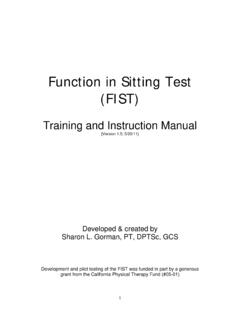Transcription of Geriatric Functional Assessment - POGOe
1 Functional Assessment OF THE ELDERLY. Objectives To determine who should have a Functional Assessment . To describe the type of screening used in evaluating frail and cognitively impaired older adults, including the function and use of the following screening instruments: Katz ADL Scale Lawton-Brody IADL Scale Get Up and Go Test and Timed Get Up and Go Test Clock Drawing Test Mini-Mental Exam Geriatric Depression Scale. To understand how Functional Assessment benefits the patient and family. Overview With the aging of the population, more frail patients are being seen by their primary care physicians.
2 Frailty is more often seen in patients 75 and older who have cognitive or physical impairments that interfere with the performance of their activities of daily living. Physical frailty is defined as dependence in at least one activity of daily living, or cognitive deterioration or decreased outside mobility. The prevalence of frailty is somewhat difficult to determine, but of those living outside of institutions, 5 to 8% of persons over 65 and more than 33% of those over 85, need assistance with at least one basic activity of daily living.
3 In 1997, there were over million ( ) elders who reported having difficulty carrying out activities of daily living (ADL's) and million ( ) who indicated difficulties with instrumental activities of daily living (IADLs). ADLs include bathing, dressing, toileting, transferring, continence, and feeding. IADLs include ability to use the telephone, shopping, food preparation, housekeeping, laundry, using transportation, responsibility for medications, managing money, using the telephone, doing housework, and responsibility for taking medications.
4 Age remains the best indicator of morbidity and morbidity determines the increasing use of health care services. Many frail elderly have multiple health problems, accompanied by multiple medications. Their medical and psychosocial problems are difficult to address in a simple visit to their primary care physician. Often the patient's ability to function in their environment is also at risk. The comprehensive Functional Assessment , which is discussed in the following sections, can decrease the number of medical specialist visits and overall health care costs and increase patient satisfaction and quality of life.
5 A Functional Assessment is often used to determine the current and future health care and psychosocial needs of frail elderly. The comprehensive Assessment of the frail elderly patient provides useful diagnostic and prognostic information and serves as a baseline for better understanding immediate and long-term patient and family needs and wishes. Useful screening techniques or instruments can provide valuable clinical and psychosocial information and can expedite the efficient Assessment of patients once they are routinely utilized and understood.
6 Many of the instruments can be administered by trained office staff or completed by patients or their caregivers. However, good observation skills are essential in order to clearly understand the status of the patient and even the caregiver responsibilities and burden. Without a healthy caregiver system, the frail elderly person is unlikely to be able to remain independent in his or her own home. When the primary caregiver is at risk the patient is also at risk. A Functional Assessment is a multidimensional and often interdisciplinary diagnostic process, which assesses and quantifies an older adult's medical, psychosocial and Functional status.
7 Information gathered in this process is used by practitioners, the patient, and family to develop a comprehensive plan for therapy and future care decisions and can also help in the process of long-term care decision-making. Primary care practitioners, both physicians and nurses, are in a pivotal position to assess patient Functional status and target interventions to prevent further loss of function and to maintain the self-care status of many elders. Performing an office-based Functional Assessment measures the elder's ability to perform self-care and fulfill the important social roles of everyday life.
8 The Functional Assessment is one of the trademarks of the Geriatric Assessment , distinguishing it from the evaluation of a younger person. Achieving a complete cure is often unrealistic since many conditions affecting the elderly are chronic in nature. While major improvements in the older adult's Functional abilities may not be possible, even small changes may significantly improve the individual's quality of life. For example, regaining the ability to move from the bed to the chair or the chair to the toilet may mean the difference between returning home from the hospital or skilled nursing home or being institutionalized.
9 Comprehensive Geriatric Assessment : A comprehensive Geriatric Assessment often requires the involvement of a trained multidisciplinary team and enough time to do a thorough patient work-up. Standard and potentially complicated testing may be involved. Members of the core team generally include the geriatrician (internist or family physician with post-residency training in Geriatric medicine), a social worker and nurse academically and/or experientially trained in gerontology. Often Geriatric Assessment clinical programs are offered in academic medical centers and in Veteran's Administration Medical Centers.
10 Other health care disciplines are often involved in initial or subsequent Assessment visits, such as the medicine specialties of neurology and psychiatry and other staff such as a dietitian, pharmacist, physical therapist, occupational therapist and psychologist. Once all of the Assessment components have been reviewed, including testing information, the core team meets with the patient and family for a summary conference. This meeting includes a review of the Assessment and recommendations for future care decisions.



